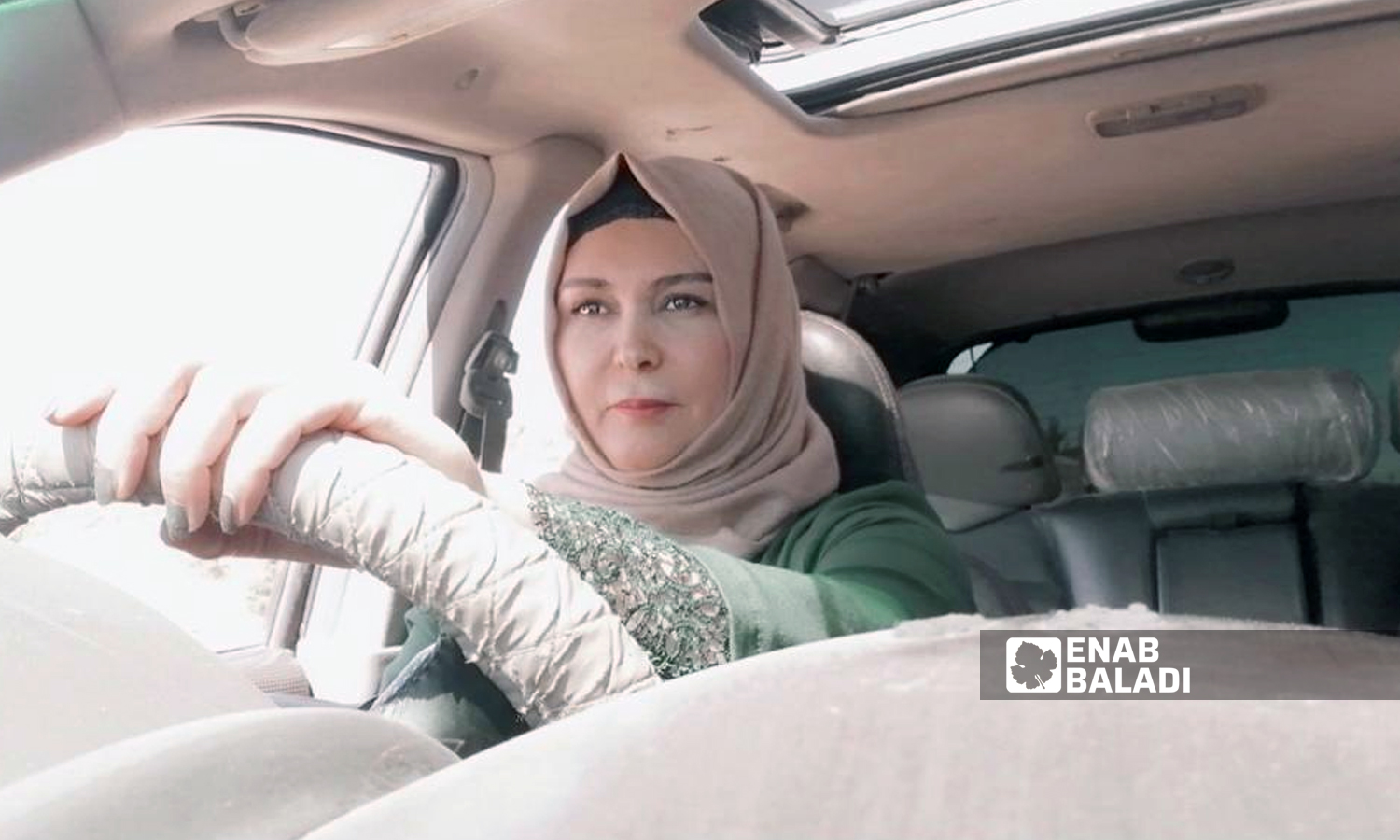



Idlib – Hadia Mansour
Forty-year-old Rawan al-Khayat has become accustomed to the same question raised by elements from the Hayat Tahrir al-Sham (HTS) on security barriers, asking “Why are you driving alone without a mahram?” whenever she drives her car in the region.
Al-Khayat told Enab Baladi that she replies to that vexing question by saying that she has no mahram to accompany her and continues driving, feeling satisfied that she managed to do away with one of the several harassments she faces on a daily basis.
Al-Khayat lost her husband due to the bombing on Maarat al-Numan city in late 2018. She decided to fend for herself and bought a car after learning to drive to use it during her frequent travels between northwestern Syrian hospitals.
Although there is no law or circular preventing women from driving in northwestern Syria, society continues to enforce restrictions on women, claiming driving to be a men’s right only.
Still, some courageous women sought to break this hardline rule, driven by their need to run their daily errands or head to work within the absence or preoccupation of the males in their lives.
The director of the social cohesion department of one of the civil society organizations in northern Syria, Asma al-Mahmoud, told Enab Baladi, “Women’s driving is the beginning of a proper command of their lives, ideas, and aspirations, facing life pressures with resolve and determination.”
“Women’s driving is not a luxury, but a necessity of life,” al-Mahmoud said.
Being a working woman, al-Mahmoud must arrive at her job on time without having to endure the types of harassment occurring when she is driven by a private car or taking public transportation that operates without scheduled times.
Al-Mahmoud complained about public transportation services, describing them as “bad” and run with infrequent schedules, waiting for passengers to fill buses and minibuses to start the vehicles.
She got late for work many times and faced real difficulties because of public transportation, which prompted her eventually to drive privately to work, marking a qualitative shift in her life, which became much more organized, as she told Enab Baladi.
Al-Mahmoud encountered lots of harassment by security elements on checkpoints and was frequently questioned about why she was driving without a legal male escort. She used to respond that she was heading to work and did not have any male guardian (father, brother, or a male relative) available to drop her off to work on a daily basis.
Al-Mahmoud added that her heart bounced with happiness every time she managed to pass the checkpoints with her car.
Still, the most challenging notion to al-Mahmoud was society’s inferior perception of female drivers and associated gender-based stereotyping.
Al-Mahmoud mentioned that her road trips become dangerous sometimes with thugs driving close to her for the mere reason of being a woman, adding that this happened to her personally and is not necessarily a recurring occurrence for other women in northern Syria.
Al-Mahmoud additionally added that at times when her car suffered minor problems on the road that she could solve easily, she was intercepted by men who said in a condescending tone, “What are you doing? Get in your car! We will fix it for you.”
Enab Baladi contacted the HTS director of media communication, Taqi al-Din Omar, to comment on restrictions enforced on female drivers in Idlib and the requirement of having a mahram inside their cars. Omar denied the existence of any law or circular on such a matter.
Omar did not exclude the application of a similar law outside cities and during late hours.
The questions raised by security barrier elements were less problematic to Ghalia al-Rahal than society’s inferior perception of women, claiming them unfit to drive or follow traffic rules and regulations.
Al-Rahal told Enab Baladi that women drivers in Idlib and northwestern Syria face bullying and mockery and receive disapproving looks on roads and are frequently asked, “Why do you want to drive? Why are you driving?” and the annoying phrase of “driving is not a woman’s thing.”
According to al-Rahal, “These questions reflect society’s condescending view of women’s potentials and the primacy of gender-based customs and traditions that still have power over most people, even those rendered as intellectuals.”
“They jump into blaming women on every road accident involving female drivers, even if they hold no responsibility whatsoever in these accidents,” al-Rahal added.
It is worth noting that women in northwestern Syria face major challenges, beginning with security threats and not ending with social restrictions aimed at reducing women’s role and active presence in society.
The restrictions can be attributed to several factors, chiefly the absence of regulations and rules governing local authorities’ treatment of women and the limited understanding of the Islamic religion’s approach to women issues.
Traditions and social norms tainted with patriarchy are also responsible for the unjustified restrictions on women.
if you think the article contain wrong information or you have additional details Send Correction